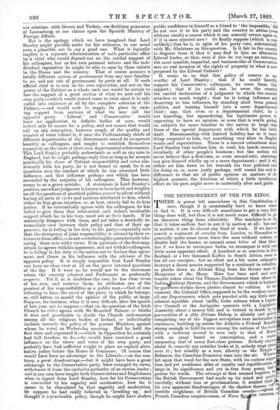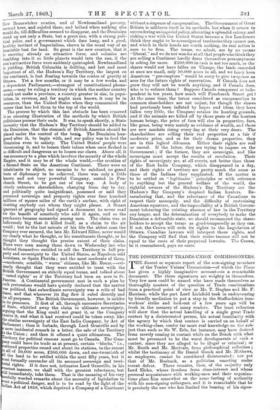THE DETHRONEMENT OF THE FUR KINGS.
Tthis is power left somewhere in th Constitution of ours, though it is occasionally hard to know where to find it. It is very difficult sometimes to get a very little thing done well, but then it is not much more difficult to get an immense thing done admirably. The machine is so big that it takes endless fuel to put it in motion at all ; but onee in motion, it can do almost any kind of work. If we have to march a regiment of cavalry from London to Hounslow we generally make some mess, leave the men without rations, or disable half the horses, or commit some bgtise of that kind; but if we have to reconquer India, we reconquer it with very little more apparent effort. A hundred or so convicts in New Zealand, or a few thousand Kaffirs in South Africa, seem to tax all our energies ; but an effort not a bit more exhaustive destroys a dozen armies supported by a continent in rebellion, or plucks down an African King from his throne near the Mountains of the Moon. More has been said and more trouble taken about the Thames Embankment than about the IndianZailway System, and the Government which is bothered by garaters strikes down pirates almost by volition. At this moment, the Colonial Office, supposed to be the weakest among all our Departments, which gets puzzled with any little intercolonial squabble about tariffs, looks solemn when a Legs tive Council at the Antipodes quarrels with a Legislative Assembly about a money bill, and is fretted to death by the perversities of a silly African Bishop, is silently and quietly completing one of the biggest enterprises ever undertakes b.1 statesmen, building up across the Atlantic a Federal Rept& strong enough to hold its own among the nations of the world, with a territory second in area only to that of Ituss,'L with an army based on conscription, and a inarIne surpassing that of many first-class powers. Nobody chattels about it, scarcely any outsider looks at it, nobody sings 10316. over it ; but steadily as a tree, silently as the Temple ot Solomon, the Canadian Dominion rises into the air. Wloever hit upon that word for the new State, with its curious Ogg° tion and yet avoidance alike of royalty and republicanism, 07 large in its significance and yet so free from pomp, 111E,I,1 genius for words. The attempt at first seemed hopeless, oul the British Government had made up its mind, and qmetlY, carefully, without fuss or proclamations, it availed itself its own apparent disadvantages, of the shadow thrown terrible neighbour, of British Canadian overber–,'Igness' ° French Canadian suspiciousness, of Nova Se n cuteness, 0 New Brunswicker avarice, and of Newfoundland poverty, coerced here, and cajoled there, and bribed when nothing else would do, till difficulties seemed to disappear, and the Dominion stood up not only a State, but a great one, with a strong political pulse, and a government which dare hang, and a good, healthy instinct of Imperialism, shown in the usual way of an insatiable lust for land. So great is the new creation, that it is exerting already an attractive force, and colonies are tumbling into it as little planets would into the sun, if the sun's attractive force were suddenly quintupled. Newfoundland is yielding, British Columbia is drifting, and last and most important of all, the Hudson's Bay Territory, the largest on the continent, is fast floating towards the centre of gravity at Ottawa. Yet a few months, or it may be a few weeks, and a dependent Parliament,—strangest of constitutional phenomena,—may be ruling a territory in which the mother country would not make a province, a country greater in size, in population, in revenue, and, for aught man knows, it may be in resources, than the United States when they commenced the career that has led them to the top of the world.
The process by which this last obstacle has been removed is an amusing illustration of the methods by which British politicians pursue their ends. It was, to speak shortly, a State necessity that the Hudson's Bay Territory should be added to the Dominion, that the stomach of British America should be placed under the control of the braizi, The Dominion hungered after it, to begin with, and our policy was to feed the Dominion even to satiety. The United States' people were threatening it, and to loosen their talons when once fleshed is as difficult and dangerous as to loosen our claws. Above all, it was necessary to a plan which involves the security of the whole Empire, and it may be of the whole world,—the creation of a Second State on the American Continent. There were no inhabitants to object, no enemies to be subdued, no grand feats of diplomacy to be achieved, there was only a little known and not very powerful Company, seated in Fenchurch Street, to be got out of the way. A body of utterly unknown shareholders, changing from day to day, and politically quite insignificant, possessed or said they possessed sovereign and property rights over four hundred millions of square miles of the earth's surface, with right of shutting anybody out whom they might please. A Stuart ignorant of geography had signed a document he never read for the benefit of somebody who sold it again, and so the purchasers became monarchs among men. The claim was so ludicrously big that it killed itself, as a claim to the air would ; but to the last minute of his life the ablest man the Company ever secured, the late Mr. Edward Ellice, never would say clearly what he thought, or his constituents thought, or he thought they thought the precise extent of their claim. There were men among them down to Wednesday last who believed themselves entitled to sell the Territory in full property and sovereignty to the United States, as Napoleon sold Louisiana, or Spain Florida ; and the most moderate of them, —moderate, sensible, "warm" citizens, like Mr. Bonar,—evidently thought that they were entitled to treat with the British Government on strictly equal terms, and talked about "vested rights" as if the Territory had been an acre in St. Pancras. A Continental government met in such a plan by such pretensions would have quietly declared that the matter !as political, that subordinate sovereignty was a relic of bad times, and that wherever its flag flew it ruled directly and for all purposes. The British Government, however, is milder lts processes. It first of all, through successive Secretaries Of State, whittled away the claim to ultimate sovereignty,
arguing that the King could not grant it, or the Company eceive it, and what it had received could be taken away, like esr. =Jar sovereignty of the East India Company, by Act of arhament ; then it forbade, through Lord Granville and by mere incidental remark in a letter, the sale of the Territory
the Union ; and then it offered a quiet ultimatum. The erritory for political reasons must go to Canada. The Com
• 3, could have its trade as at present, certain "blocks," i.e., ttered properties round and about its stations, to the extent all of 50,000 acres, £300,000 down, and one-twentieth of 11 the land to be settled within the next fifty years, but it t formally surrender all its assumed sovereign and terrinal rights. If it does not, intimates Lord Granville, in his .cetest manner, we shall with the greatest reluctance, but till immediately, take them. That is the meaning of his very refully worded remarks about the necessity of legislation to vett. apolitical danger, and is to be read by the light of the than Act of 1858, which deprived a Company of a Continent
without a sixpence of compensation. The Government of Great Britain is mildness itself in its methods, but when it comes to surrendering animperial policy, alienating a splendid colony, and risking a war with the United States because a few Londoners think they ought to be sovereigns of territories they cannot use, and which in their hands are worth nothing, its real action is sure to be firm. The terms, we admit, are by no means "liberal," and we do not wonder at all that people who think they are selling a Continent hardly deem themselves presumptuous in asking for more. £300,000 in cash is not too much, or the shares would not have fallen on 'Change, the lands conceded at once are small, only 50,000 acres in all, and we fancy keen American " pre-emptors " would be sorry to give twopence an acre for the future rights of reservation. If Canada does not grow they will not be worth anything, and if Canada does, who is to enforce them ? Suppose Canada conquered or independent in ten years, how much will Fenchurch Street get ? At the same time, the terms considered as compensation to common shareholders are not unjust, for though the shares had previously been inflated by hopes and ideas, they have fallen very little, the Company retains its hunting grounds, and if the animals are killed off by those pests of the hunters human beings, the price of furs will rise in proportion, furs, like gems, being worn mainly as evidence of wealth, and there are new markets rising everyday at their very doors. The shareholders are selling their real properties at a fair if moderate price, and as for their dream properties, they are in this logical dilemma. Either their rights are real or unreal. If the latter, they are trying to impose on the Government ; if the former, they are sovereigns, and like
sovereigns must accept the results of revolution. Their rights of sovereignty are, at all events, not better than those of the East India Company, which disappeared in a day, and their rights of territory are pretty much the same as those of the Indians they supplanted. If the matter is to be settled on " legitimate " principles or with reference to anything but the general welfare of the world, the rightful owners of the Hudson's Bay Territory are the Hudson's Bay Company's despised Indian hunters. Remembering that, and the reluctance of the Canadians to respect their monopoly, and the difficulty of restraining American squatters, and the impossibility of a British Government tolerating the existing absence of law in the Territory any longer, and the determination of everybody to make the Dominion a defensible state, we should recommend the shareholders to accept the terms as good-temperedly as they can. If not, the Crown will cede its rights to the Legislature of Ottawa, Canadian lawyers will interpret those rights, and the Company will find that their entire income will not be equal to the costs of their perpetual lawsuits. The Crown, be it remembered, pays no costs.



































 Previous page
Previous page